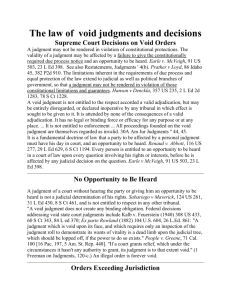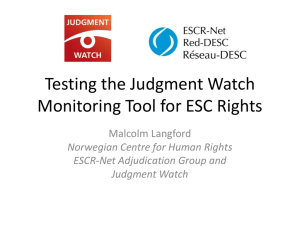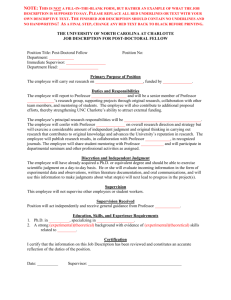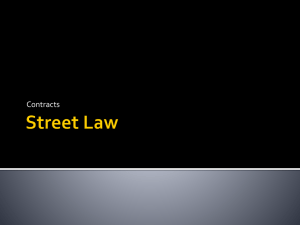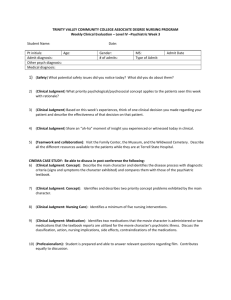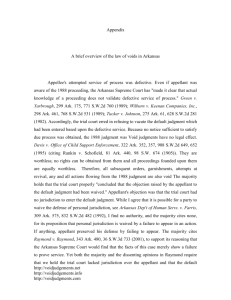Void Judgments: Supreme Court Decisions & Legal Principles
advertisement
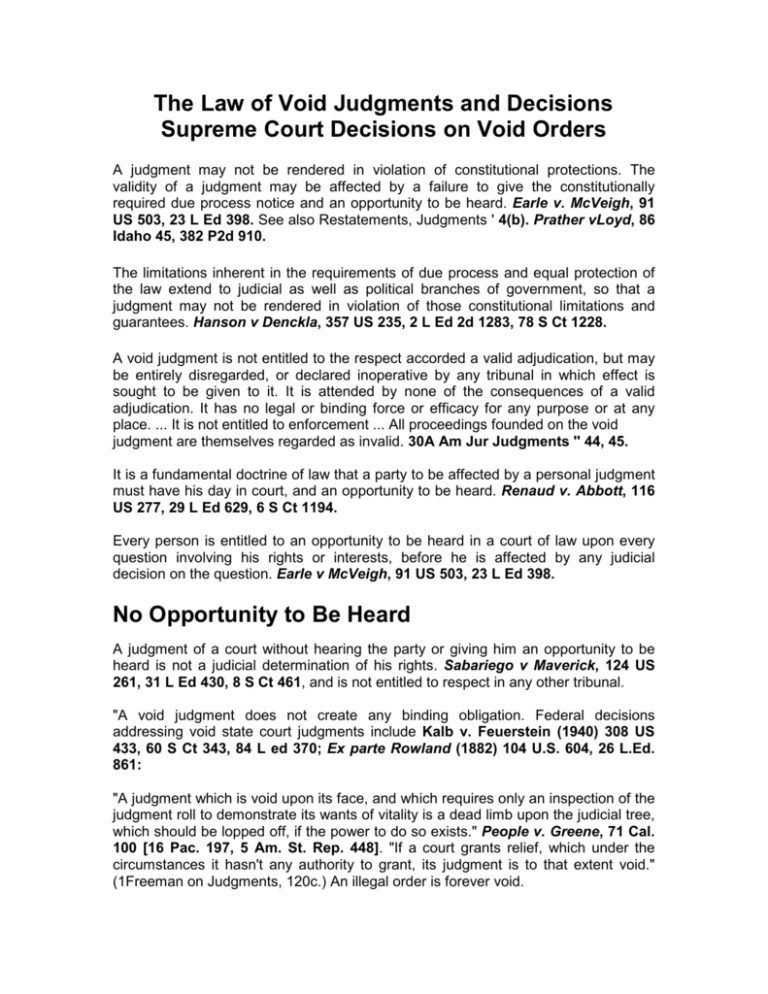
The Law of Void Judgments and Decisions Supreme Court Decisions on Void Orders A judgment may not be rendered in violation of constitutional protections. The validity of a judgment may be affected by a failure to give the constitutionally required due process notice and an opportunity to be heard. Earle v. McVeigh, 91 US 503, 23 L Ed 398. See also Restatements, Judgments ' 4(b). Prather vLoyd, 86 Idaho 45, 382 P2d 910. The limitations inherent in the requirements of due process and equal protection of the law extend to judicial as well as political branches of government, so that a judgment may not be rendered in violation of those constitutional limitations and guarantees. Hanson v Denckla, 357 US 235, 2 L Ed 2d 1283, 78 S Ct 1228. A void judgment is not entitled to the respect accorded a valid adjudication, but may be entirely disregarded, or declared inoperative by any tribunal in which effect is sought to be given to it. It is attended by none of the consequences of a valid adjudication. It has no legal or binding force or efficacy for any purpose or at any place. ... It is not entitled to enforcement ... All proceedings founded on the void judgment are themselves regarded as invalid. 30A Am Jur Judgments '' 44, 45. It is a fundamental doctrine of law that a party to be affected by a personal judgment must have his day in court, and an opportunity to be heard. Renaud v. Abbott, 116 US 277, 29 L Ed 629, 6 S Ct 1194. Every person is entitled to an opportunity to be heard in a court of law upon every question involving his rights or interests, before he is affected by any judicial decision on the question. Earle v McVeigh, 91 US 503, 23 L Ed 398. No Opportunity to Be Heard A judgment of a court without hearing the party or giving him an opportunity to be heard is not a judicial determination of his rights. Sabariego v Maverick, 124 US 261, 31 L Ed 430, 8 S Ct 461, and is not entitled to respect in any other tribunal. "A void judgment does not create any binding obligation. Federal decisions addressing void state court judgments include Kalb v. Feuerstein (1940) 308 US 433, 60 S Ct 343, 84 L ed 370; Ex parte Rowland (1882) 104 U.S. 604, 26 L.Ed. 861: "A judgment which is void upon its face, and which requires only an inspection of the judgment roll to demonstrate its wants of vitality is a dead limb upon the judicial tree, which should be lopped off, if the power to do so exists." People v. Greene, 71 Cal. 100 [16 Pac. 197, 5 Am. St. Rep. 448]. "If a court grants relief, which under the circumstances it hasn't any authority to grant, its judgment is to that extent void." (1Freeman on Judgments, 120c.) An illegal order is forever void. Orders Exceeding Jurisdiction An order that exceeds the jurisdiction of the court is void, and can be attacked in any proceeding in any court where the validity of the judgment comes into issue. (See Rose v. Himely (1808) 4 Cranch 241, 2 L ed 608; Pennoyer v. Neff (1877) 95 US 714, 24 L ed 565; Thompson v. Whitman (1873) 18 Wall 457, 21 l ED 897; Windsor v. McVeigh (1876) 93 US 274, 23 L ed 914; McDonald v. Mabee (1917) 243 US 90, 37 Sct 343, 61 L ed 608. "If a court grants relief, which under the circumstances it hasn't any authority to grant, its judgment is to that extent void." (1 Freeman on Judgments, 120c.) "A void judgment is no judgment at all and is without legal effect." (Jordon v. Gilligan, 500 F.2d 701, 710 (6th Cir. 1974) "a court must vacate any judgment entered in excess of its jurisdiction." (Lubben v. Selective Service System Local Bd. No. 27, 453 F.2d 645 (1st Cir. 1972). A void judgment does not create any binding obligation. Federal decisions addressing void state court judgments include Kalb v. Feuerstein (1940) 308 US 433, 60 S Ct 343, 84 L ed 370. Federal judges issued orders permanently barring Stich from filing any papers in federal courts. After Judges Robert Jones and Edward Jellen corruptly seized and started to liquidate Stich's assets, Judge Jones issued an unconstitutional order barring Stich from filing any objection to the seizure and liquidation. Void Orders Can Be Attacked At Any Time An order that exceeds the jurisdiction of the court, is void, or voidable, and can be attacked in any proceeding in any court where the validity of the judgment comes into issue. (See Rose v. Himely (1808) 4 Cranch 241, 2 L ed 608; Pennoyer v. Neff (1877) 95 US 714, 24 L ed 565; Thompson v. Whitman (1873) 18 Wall 457, 21 l ED 897; Windsor v. McVeigh (1876) 93 US 274, 23 L ed 914; McDonald v. Mabee (1917) 243 US 90, 37 Sct 343, 61 L ed 608. U.S. v. Holtzman, 762 F.2d 720 (9th Cir. 1985) ("Portion of judgment directing defendant not to import vehicles without first obtaining approval ... was not appropriately limited in duration and, thus, district court abused its discretion by not vacating it as being prospectively inequitable." Id at 722.
